French President Emmanuel Macron is set to visit Morocco from October 28 to October 30, as confirmed by the Royal Palace. This visit comes at a time of heightened tensions in the region, with the war between Israel and Hezbollah expected to have a significant impact on Lebanon’s economy.
According to the United Nations Development Program (UNDP), the ongoing conflict is projected to reduce Lebanon’s GDP by 9%, leading to a substantial decline in economic activity. The report indicates that the consequences of the war are likely to persist even after it ends, with GDP expected to contract in the following years.
The UNDP’s rapid appraisal highlights the need for international support for Lebanon, which is already facing economic challenges and political crises. The escalation of violence between Israel and Hezbollah has further exacerbated the situation, with widespread damage to physical infrastructure and productive capacities.
The report warns of the significant economic fallout in 2024, which is expected to surpass the damage caused by the 2006 conflict between Hezbollah and Israel. The closure of critical border crossings for trade is projected to result in a 21% drop in trade activities, leading to job losses in key sectors such as tourism, agriculture, and construction.
Furthermore, Lebanon has already experienced massive environmental losses over the past year, including contamination from hazardous materials like white phosphorus. The UNDP emphasizes the urgent need for international assistance to address the spike in humanitarian needs and mitigate the long-term social and economic consequences of the conflict.
Lebanon’s government revenue is expected to fall by 9%, while total investment is projected to decline by more than 6% through 2025 and 2026. The country’s crisis response minister has stated that Lebanon requires $250 million per month to support over 1.2 million people displaced by Israeli strikes.
In light of these challenges, President Macron’s visit to Morocco takes on added significance as he seeks to strengthen regional cooperation and address the pressing issues facing countries in the Middle East. The international community’s support will be crucial in ensuring sustainable recovery for Lebanon and promoting stability in the region.
